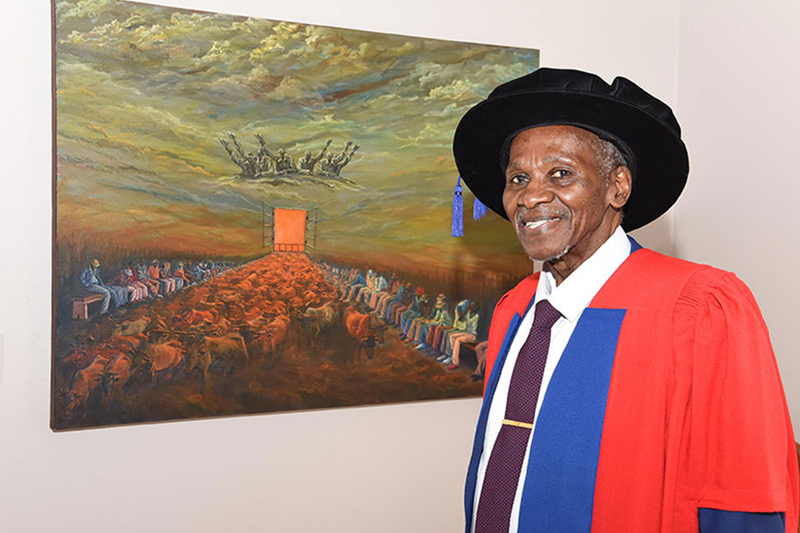Professor LBBJ Machobane (1941–2025)
22 August 2025 | Compiled by Fezeka Dzanibe. Photo Nasief Manie. Read time 4 min.
25 October 1941–9 August 2025
The University of Cape Town (UCT) mourns the passing of Professor Lehlohonolo Burns Banda Jiyane (LBBJ) Machobane, a scholar and statesman whose academic and public service contributions have left an indelible mark on Southern Africa. Born on 25 October 1941 in Morija, Lesotho, Professor Machobane passed away on 9 August 2025, leaving behind a profound legacy as a leading authority on Basotho history and a dedicated advocate for education and cultural preservation.
In March 2024, UCT awarded Machobane the Doctor of Social Science (honoris causa), in recognition of his transformative impact on cultural studies, community development, and education. A pioneer of African scholarship, he was highly regarded for his multifaceted leadership and the far-reaching influence of his work across the region.
Academic journey
Machobane’s academic path took him from Lesotho to the United States and back, with groundbreaking achievements. After being awarded a Ford Foundation scholarship in 1960, he pursued education at the Piney Woods School in Mississippi before attending Tuskegee Institute, where he earned a Bachelor of Science in History and Literature in 1967. He continued his studies at Lehigh University, earning a Master of Arts in History in 1974. Machobane then made history as one of the first Basotho to obtain a PhD, which he earned from the University of Edinburgh in 1987.
His dissertation, which became his seminal work Government and Change in Lesotho, 1800–1966, remains a cornerstone for understanding Lesotho’s political evolution. Upon his return to Lesotho in 1975, he joined the Ministry of Education before beginning a distinguished academic career at the National University of Lesotho (NUL). Over nearly three decades, he mentored generations of students and became the director of the Institute of Southern African Studies at the NUL, contributing immensely to the academic landscape of his country.
Public service and impact
In addition to his academic work, Machobane was a key figure in public life. He served as the minister of education from 1988 to 1992, where he championed policies that improved teachers’ pensions, particularly for women, and established the Teaching Services Commission. His efforts played a pivotal role in increasing the number of female teachers and improving the national education system.
His influence extended beyond Lesotho. He served on the executive board of the Association of African Universities and was part of the World Bank Advisory Board on Education in Africa. He was also a founder of the Lesotho Council of Arts in 1993 and later served as president of the Lesotho Academy of Arts.
As a historian, his research transcended traditional boundaries, exploring themes of governance, chieftaincy, gender, and religion. His contributions to Southern African historical scholarship are invaluable, with his work continuing to inform research conducted by scholars across the region.
A lasting legacy
Machobane’s retirement in 2004 did not mark the end of his influence. He continued to inspire through his involvement in the Lesotho-orientated research group anchored at UCT’s Archive and Public Culture Research Initiative. This research group, consisting of scholars and doctoral students from diverse disciplines, regularly draws upon his work, which remains an essential foundation for understanding the complex history of the Basotho people and their neighbours.
Described by Public Eye newspaper at the time of his retirement as “a historian, researcher, author, instructor, administrator, statesman, revolutionary, and a history professor of international renown,” Machobane’s life was dedicated to advancing the study of history, education, and culture in Southern Africa. His contributions to both his country and the wider region will continue to resonate for generations.
His passing marks the loss of a towering intellectual and a champion of African scholarship and education. He is survived by eight siblings, four children, six grandchildren and one great grandchild.
Lala ka Khotso, Professor Lehlohonolo Machobane.
 This work is licensed under a Creative Commons Attribution-NoDerivatives 4.0 International License.
This work is licensed under a Creative Commons Attribution-NoDerivatives 4.0 International License.
Please view the republishing articles page for more information.










